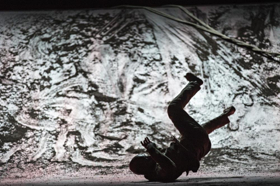Broadwayworld Dance Review: Akram Khan's Xenos at the Lincoln Center White Light Festival, November 1, 2018.

I went to Akram Khan's Xenos, from the Greek meaning stranger or foreigner, with some trepidation. As much as I've admired Khan, I have reservations about one-person performances. They can be over-indulgent, maddening, self-congratulatory, yes even enchanting, perceptive and moving. Yet I have never been a fan. When you have only one person on stage alone for an hour with no interaction other than the scenery (no matter how good it is), a few musicians, and the audience in front of you, it's daunting. I don't care what the background of the performer. There are too many landmines-and they were very much in evidence here.
One thing that has always bothered me-program notes, especially when the verbiage runs to the grandiose: "Xenos reveals the beauty and horror of the human condition in its portrait of an Indian dancer whose skilled body becomes an instrument of war. "X" is no man and everyman, the unknown and the eternal soldier, alone in a foreign land, a stranger to himself and to an enemy he does not know. Xenos is a portrait of Homo deus brought back to his human origins in clay and fire. In the end we surrender not to gods, tradition, or empire, but to the earth itself."
That's profound!!! I wonder who wrote that? Because in the end it means absolutely nothing.
Oh, I just checked. Ruth Little, the dramaturg for Xenos, did write that. I realize that I am not a great intellectual or thinker, but could someone please explain this to me? Or should I just figure it out for myself?
Which I did, but probably in a different way than was intended.
Perhaps it's best to look at Akram Khan as a performer himself, since his grounding is not in ballet or modern dance, even though he has choreographed in both mediums.
Khan's background is in Kathak, the Hindi name for the eight major forms of classical dance, which dancers than use to tell various stories through their hand movements and footwork, but most importantly through their facial expressions. From this comes Kathaka, "the one who tells a story", or "to do with stories." Wandering Kathakars communicated stories from the great epics and ancient mythology through dance, songs and music in a manner reminiscent of early Greek theatre.
Khan shows himself to be a fine Kathaka, his body can express all emotions, his transformations are quite extraordinary, but still, there is a hole in the narrative. It becomes meaningless. For all Khan's extraordinary outpouring, there is still nothing to grasp on to.
Here he is a soldier in World War I, experiencing a respite at home. The set when he first enters seems to be an inviting living room, but as it changes to a battle zone it becomes gray and menacing. A no-man's land. Khan works with this, he falls down the wall, he gets up, and he is partly engulfed in the dirty soil rolling down the slope. He perseveres-but for what?
The battleground is his body, but he can't let loose. This is the great moment of the solo, when everything converges on despair and fright. It is something I won't forget. But it's a moment. The body, for all its movement, is static for the simple reason that there is no one else on the battlefield but Khan. Disillusion in war can be expressed in words, I believe. Movement alone doesn't register as a solo in this context.
What should follow is a crescendo and clash of the human soul; yet for all the noise, all the body jangling, becomes a whimper. It could have been done in 30 minutes when its nerve and total rawness would have affected the audience. By the time it ended, many of the people around me had left.
This was billed as Khan's final solo. He will be retiring his body after this, and it is time. A performer can only do so much with his instrument; Khan has reached the limit.
I still wonder if he will have more to offer us.
Reader Reviews

Videos

